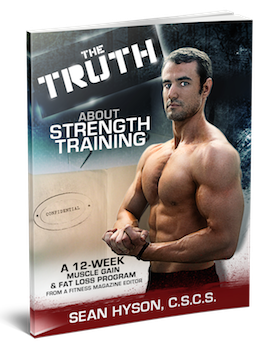Guest Post By Sean Hyson C.S.C.S.
When you’re a beginner, you don’t think too much about the program you’re on or what food you need to eat to maximize the results. It’s enough to just go to the gym and lift hard.
And go ahead and ask an advanced lifter about his training. It’s probably so simple you won’t believe it.
But when you’re in between those two stages—an intermediate meathead—you’ve been exposed to just enough information that you analyze, and then over-analyze, everything. And that’s when you fall for the tricks that hold back your progress.
Jay and I often have a laugh talking about all the crap ideas surrounding training and nutrition that we bought into when we were young and naïve.
When we got more experienced we learned that most of the so-called “rules” of building muscle and burning fat aren’t that important after all. In fact, following them doesn’t do nearly as much to speed your progress as you may think, and it might even be slowing you down.
Here are two muscle and fat-loss myths you can stop worrying about immediately.
1) “You have to cut out carbs to get lean”
I’m sure you’ve heard many stories about people getting ripped on low-carb diets, and while this is an approach that both Jay and I have recommended in the past, it just isn’t necessary.
There’s nothing about carbohydrates that promotes fat gain. Yes, they do prompt an insulin response, but ALL foods do—including whey protein, which has been lauded as one of the all-time great fat-loss supplements.
It’s not as simple as “you eat carbs, your insulin goes up, and you store fat”. If it were, the vast populations of many Asian countries would be obese, given how much rice they generally eat.
So if carbs aren’t the problem, what is?
Calories. Well… EXCESS calories, to be specific. There are a certain number that your body needs in a day to maintain all its current functions at the body weight you are now.
If you exceed that number, you get fatter (unless you’re lifting weights and eating to fulfill a particular macro count for muscle gain). It doesn’t matter if the excess is from carbs, protein, or fat. If there’s spillover, your waistline spills over.
And don’t think that you have to eat the bulk of your carbs in the morning either so you can “burn them off” before you go to bed. A 2011 study published in Obesity found that police officers who followed a diet that had them consuming most of their carbs at dinner lost more weight (especially around their waists) than a control group eating carbs earlier in the day. They also controlled hunger better, and IMPROVED their insulin sensitivity.
What does this tell us? Not only does eating most of your carbs at night not hurt fat loss, it could actually help it. And, ultimately, it’s calories that matter on a diet—not the exclusion of any one nutrient or food.
I’ll say one last thing about this: The diet I follow allowed me to eat 300 grams of carbs daily and lose 30 pounds in 12 weeks.
2) “You need a big insulin spike post-workout”
I believed in, and recommended, this nonsense for years. And to anyone that I may have inadvertently encouraged to develop diabetes as a result, please accept my apologies.
Nutritionists (and supplement companies) have been telling lifters that muscles need a big shot of insulin right after training in order to recover and grow, and scientifically-formulated shakes—or even straight sugar—are necessary to get the pancreas a’ pumpin’.
But the truth is, lifting weights allows you to get nutrition into the muscles without insulin’s help. It’s called the “insulin-independent phase of glycogen restoration”.
As shown in a 2005 study in the Journal of Applied Physiology, muscle glucose transporters travel to the cell membranes as a result of the contractions from the lifting you’ve done. From there, they can bring carbs into the muscle cells.
There’s simply no need to drink expensive potions or eat candy after a workout. In fact, doing so just adds more calories to your diet you don’t need and could play a part in keeping you fat.
With that said, carbs DO play an important role in the post-workout period, but it has nothing to do with insulin. My book discusses this at length, and debunks many other myths.
 The Truth About Strength Training—available NOW—includes a 12-week workout and diet program. In addition to the many ideas that are not important for making great gains, my book lists the few that are. Master them and, as Metallica wrote, “nothing else matters.”
The Truth About Strength Training—available NOW—includes a 12-week workout and diet program. In addition to the many ideas that are not important for making great gains, my book lists the few that are. Master them and, as Metallica wrote, “nothing else matters.”
Click HERE to pick up The Truth About Strength Training.
SOURCES:
Insulin independent phase
http://jap.physiology.org/content/99/1/338
Carbs at dinner


